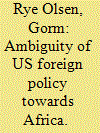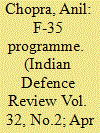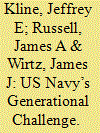| Srl | Item |
| 1 |
ID:
154479


|
|
|
|
|
| Summary/Abstract |
Abstract
Since 9/11, the American policy towards Africa has been strongly influenced by national security interests and in particular by the fight against international terrorism and Islamic radicalisation. Traditionally, the American Africa policy has been the result of bureaucratic policymaking with the Pentagon and the State Department playing prominent roles. The paper argues that in the current century, evangelical Christian lobby groups have gained increasing influence on policymaking on Africa. Because policymaking has been influenced by a number of different actors, the American Africa policy may appear incoherent and ambiguous if judged narrowly on the expectation that it only aims to take care of US national security concerns and economic self-interests. The paper concludes that Africa was important to the United States during the presidencies of George W. Bush and Barack Obama because of the combination of strong security interests and strong domestic lobby groups that have pressured to place Africa on the US foreign policy agenda.
|
|
|
|
|
|
|
|
|
|
|
|
|
|
|
|
| 2 |
ID:
144182


|
|
|
|
|
| Summary/Abstract |
Faced with the prospect of its adversaries mitigating its long-held superiority in sophisticated weapons systems, the US announced in 2014 that it was about to embark on a ‘third offset strategy’ in order to maintain its military-technology edge. In its quest to harness new technologies and operational concepts however, the third offset strategy is likely to raise important questions for Europe and NATO. Daniel Fiott addresses some of the major issues at hand related to alliance politics in NATO and some of the potential defence-industrial effects.
|
|
|
|
|
|
|
|
|
|
|
|
|
|
|
|
| 3 |
ID:
154275


|
|
|
|
|
| Summary/Abstract |
The F-35 programme was being driven by a way professional team of uniformed and civilian members of the Pentagon. The Indian MoD needs to have such core ability and learn programme management. Public criticism of the Pentagon for the programme resulted in huge public and government pressure and in turn, aircraft improvements and cost cuts. President Trump himself has been a critic of the cost overruns and delays. Pentagon has no more money to pour into the programme after three costly restructurings in recent years. At one stage, there was a proposal to invite an open tender for all follow-on projects in the programme.
|
|
|
|
|
|
|
|
|
|
|
|
|
|
|
|
| 4 |
ID:
143728


|
|
|
|
|
| Summary/Abstract |
EARLY IN THE 21ST CENTURY, America's Middle Eastern policy suffered a series of failures that have decreased its security level, as well as that of its allies and the rest of the world. Today, these failures sprouted in Iraq and Syria where Washington's political and military interference had stirred up terrorist and extremist activities. The Islamic State of Iraq and the Levant (ISIL has become a regional actor and has dented regional stability and Washington's defense capabilities.
|
|
|
|
|
|
|
|
|
|
|
|
|
|
|
|
| 5 |
ID:
186370


|
|
|
|
|
| Summary/Abstract |
Technological, social and environmental developments are producing changes at such a rate that they threaten to overwhelm the ability of individuals, societies and governments to adapt. The pace and impact of this technological churn is especially difficult for the US Navy because of the long time frames involved in traditional navy planning, acquisition and personnel cycles. The US Navy should prepare to ride succeeding waves of techno-strategic change – particularly the ‘robotics wave’ – and apply the rules of strategy in thinking about the role of technology in war at sea.
|
|
|
|
|
|
|
|
|
|
|
|
|
|
|
|